- Home
- Steve Erickson
Full-Blooded Fantasy Page 2
Full-Blooded Fantasy Read online
Page 2
After a long while Thorgil turned to Jack and once again spoke in perfect Saxon. “I will not kill you because you belong to Olaf One-Brow. It is his privilege to do so. However, the girl is my thrall.” He smiled coldly. “I will kill her whenever I wish, if you displease me.” And he turned again to ply his single oar.
Chapter Eleven
THE SHIELD MAIDEN
They traveled all day, with breaks to let the oarsmen rest. The sky remained gray, but the clouds lifted enough for Jack to see land far to the left. At one point they passed an island that trailed plumes of smoke. Was that the Holy Isle? It was too hazy to tell.
At one point the rowers halted, and Olaf One-Brow passed out smoked fish, cheese, and a kind of flatbread Jack had never seen before. He thought it delicious until he realized it had been stolen from some poor village. Olaf found a pot of honey and smeared it on the bread for Lucy. No one else got this treat.
“Litla valkyrja,” the giant rumbled, tousling Lucy’s hair.
“Princess,” corrected Lucy. They smiled at each other.
“Pest,” said the boy at the oar.
Jack studied him. Thorgil was handsome, in a sullen way. His eyes were blue, and his hair would have been as golden as Lucy’s if it hadn’t been so dirty. The berserkers were all filthy, Jack realized. Their boots smelled like carrion, and their sheepskins reeked of sweat. Lucy, in her sky blue dress, looked like a flower dropped into a pigsty.
What was he to do about her? Jack might try swimming to shore by himself, but he couldn’t leave her behind. Olaf One-Brow might possibly be talked into setting her free, but Lucy didn’t belong to him. The berserkers set great store by ownership. Once Thorgil had pinched her, to see Jack’s reaction, and Olaf had done nothing about it.
They slid north on the gray ocean until the sun broke out in late afternoon. It hovered, red and swollen, over the horizon as they turned toward land. Jack saw a dense forest and fires along the shore. Two other boats had been drawn up. Shouts greeted their arrival.
Altogether the warriors numbered about forty men and seven boys. The ones on shore were showing off the booty they had taken—embroidered shawls, necklaces, even pairs of dainty ladies’ shoes draped about their necks like trophies. They pranced around, guffawing and pointing at one another. Other loot was displayed on the sand: metalwork, pottery, spoons, swags of richly colored cloth, and a jeweled cross that might have come from the Holy Isle. Huddled next to the forest were the captives, with their legs hobbled.
Jack was hustled to this group, but Lucy was presented like a rare prize to the assembled warriors. Olaf lifted her over his head and boomed “Litla valkyrja!” before he put her down. Everyone admired her. Lucy bowed. They bowed back. She clapped her hands and they laughed. She was caught up in her princess fantasy, but Jack was desperately worried about the berserkers’ true motives.
“She’s a little charmer, isn’t she?” a woman said. She was thin, her eyes full of grief. “I had a daughter. She wasn’t as beautiful as your sister.” She fell silent, and Jack thought he knew what had happened. The woman’s daughter had not been pretty enough to keep.
“The girl’s a slave like the rest of us,” said a man in a torn monk’s robe. “They’ll raise her like a prize pig and then sell her.”
“At least she’s alive,” Jack said.
“Sometimes death is better.”
“No, it isn’t.”
The monk laughed harshly. “Hark at him! The child presumes to lecture his elders. Listen, boy. Long life is but a chance to commit more sins. The longer you live, the more Satan whispers in your ear. Your soul grows so heavy, it gets dragged down to Hell. It’s better to die young, preferably right after baptism, and be taken into Heaven.”
“My daughter is in Heaven,” said the sad-eyed woman.
“Yes, well, you don’t know that,” the monk said. “Even quite small children are capable of evil.”
“I know she is,” the woman said fiercely.
“And I believe you,” said Jack. “I think it depends on whether someone means to be bad. My sister Lucy can drive you crazy, but she hasn’t an evil bone in her body.”
“Man is born corrupt,” the monk said in a hollow voice. Jack made no answer. That was the sort of thing Father said all the time.
The warriors gorged themselves on roast meat until their bellies bulged and their beards shone with grease. They drank mead until they fell over. Fights broke out. More than one man went to bed with a cut lip or a bloody nose, but it seemed to be in good fun. Jack noticed, however, that some did not take part.
Olaf One-Brow’s group camped by themselves. No one playfully punched them or threw sand in their hair. No one uttered a catcall in their direction. It seemed that Olaf’s men were too important to indulge in horseplay.
The exception was Thorgil. Another lad with chopped-off hair ran past the group and threw a pebble at the boy. Thorgil sprang to his feet with a shout and took off after the offender. Round and round they went until Thorgil caught up with his tormentor.
“Hættu!” cried the short-haired lad.
“Aldrei! Nei!” shouted Thorgil.
The others danced around, singing, “Dreptu hann! Dreptu hann!”
“They’re saying, ‘Kill him! Kill him!’” the monk said quietly.
“You know their language?” said Jack. Thorgil was getting the best of the fight because he was so much more frenzied.
“Oh, yes. I have had occasion to preach to these…animals.”
By now the short-haired lad was trying to escape, but Thorgil pulled him back and proceeded to pound and kick him in a sickening way. The cries of the watchers changed to “Nóg! Hættu!”
“They’re saying, ‘Enough! Stop!’ But she won’t,” said the monk.
“She?” Jack was startled from his fascination with the fight. It was getting nasty, with Thorgil pulling the boy’s head back in an attempt to break his neck.
“Oh, yes. That’s a girl.”
“Nóg,” growled Olaf One-Brow, plucking Thorgil from the fray as easily as picking up a kitten. The shorthaired boy scuttled off on hands and knees. The others scattered.
“I’m surprised,” said the monk. “Olaf usually lets a fight go through to the end.” The giant lumbered back across the sand with Thorgil tucked firmly under his arm.
“How can that be a girl?” said Jack. He’d known some bad-tempered girls in the village, but none of them would have thrown themselves into such a vicious fight. None of the boys, either, for that matter.
“She’s a shield maiden,” said the monk. “A little abomination who will certainly toast her heels in Hell for all eternity. She’s trying to make the grade with Olaf, so she’s twice as likely to pick fights as his men. And they’re no slouches.” The monk stared long and hard at the group. By now most of the warriors had collapsed on the sand in a drunken stupor. Only Olaf’s men spread cloths and lay down properly.
They formed a square as though, even in sleep, they were in military formation. In the middle lay Thorgil. Next to her, on a blanket, was Lucy. She had a real pillow and a richly embroidered cover that might have been taken from a church altar.
“What’s a brjóstabarn?” said Jack.
“What a strange question,” said the monk.
“It’s what Olaf called Thorgil.”
“Ah.” The monk nodded in somber understanding. “It means ‘suckling baby.’ He’s calling Thorgil that to make her angry. Making people angry is a favorite pastime of the Northmen.”
“And what is a—” Jack had to stop to recall the word. “—a kettlingaklór?”
The monk laughed bitterly. “It means ‘kitten scratch.’ It’s what these people call a blow that knocks you flat. I gather you had one.”
“Yes,” said Jack.
“You seem no worse for it. Trust me, you don’t want to find out what a really big cat scratch feels like.”
With that, the monk withdrew into his own thoughts and refused to talk. Jack watched
the flickering fires, the sprawled warriors, and the neat square where Olaf and his people lay.
The captives were guarded by three men, who had not been allowed to drink. Escape was impossible. Besides, Jack thought as he stretched out on the cold, damp ground, he couldn’t leave without Lucy. And there was no way he was going to rescue her from that ominous square of Olaf’s men.
They camped on the beach for several days. Boats went out and returned with booty. Finally, when the warriors had amassed as much as they could carry, the whole group sailed north.
It was extremely uncomfortable. Jack and the other captives were packed like trussed-up chickens. They lay faceup, able to see only the sky and to feel the cold water sloshing under their backs. The boats leaked continuously. Captives were freed in shifts to bail them out. When it was Jack’s turn, he was horrified to see how near the sea came to spilling inside. The boat was so heavily laden, one more roll of cloth could send them to the bottom.
That’s a girl, he thought, eyeing Thorgil. He now understood that her oar was a rudder used to steer the boat. Plying a real oar would have been beyond her strength. Jack tried to imagine her in a dress and couldn’t. She was too brutish. When the men tossed insults back and forth, she outdid them in malice. When they spat and farted, she joined in.
Altogether she was the most disgusting creature—male or female—Jack had ever seen. He had always to come between her and Lucy, for Thorgil’s greatest joy was to cause pain. She never—quite—drew blood, but Lucy’s arms were covered with bruises from pinches.
Jack wondered at the little girl’s ability to keep up her spirits. Surely by now she knew she wasn’t headed for a castle. At the very least she must miss Mother and Father. Yet Lucy picked herself up after every pinch, wiped her eyes, and found Olaf. She ordered him around like a favorite hound, and if the giant didn’t actually obey her, Lucy pretended he did. It was curious and disturbing at the same time.
Olaf wasn’t a safe companion. He dealt out punishment with a quick hand, breaking teeth or cracking a rib according to his mood. Seeing Lucy with the monster made Jack sick. But there was nothing he could do about it.
On the third day a storm rose. The boat rolled frighteningly and waves splashed over the side. All the captives bailed furiously while the oarsmen struggled to reach shore. The sad-eyed woman collapsed. She hadn’t been strong to begin with. Olaf dragged her up, and with a swift movement that made Jack cry out, he cut her throat and threw her over the side.
Jack and the others were frozen for one long moment. Then they redoubled their efforts before Olaf turned his attention to them. Even so, the shore remained agonizingly distant. The oarsmen were pushed back by the wind and lost two strokes of progress for every three they made. Thorgil clung grimly to her rudder. The sea attempted to snatch it out of her control, but she ground her teeth and fought back.
“May angels carry you to your daughter’s side,” whispered the monk as he toiled. “May your time in purgatory be short.”
He was praying for the poor, murdered woman. Tears rolled down Jack’s face, mixed with rain. He didn’t even know her name, and already her face was blurred in his memory. May the life force hold you in the hollow of its hand, Jack thought, repeating words he had learned from the Bard. May you return with the sun and be born anew into the world.
It wasn’t a prayer Father would have liked. He would have knocked Jack six ways to Sunday for saying it. But Jack thought it right and sensible to call on two religions, in case one failed.
Lucy was packed between rolls of fur and cloth. Jack could hear her crying over the storm, which was so intense now, he couldn’t see the stern of the boat. He tried not to think about the poor, dead woman. His duty was to see that Lucy didn’t suffer the same fate—if they didn’t both drown, that is. Jack no longer felt the sharp terror that had been with him in the first days of their captivity. The best he could manage was a dull, oxlike misery.
Olaf moved down the ship, handing out coins to the men.
“Now we’re in real trouble,” grunted the monk.
“Is he paying them?” said Jack, who was so exhausted, he no longer felt pain.
“He’s giving them gold so they won’t show up empty-handed in the halls of their sea god. Satan will take that gold off them and kick them straight down to Hell.” The monk smiled cheerlessly.
Even a little hellfire would be welcome now, Jack thought. The cold made him clumsy, and the bailing bucket kept slipping out of hands. He was so tired, he saw spots before his eyes. He was terrified of fainting. Fainting meant death.
“Land fyrir stafni!” someone shouted. A gap in the driving rain showed they were, in fact, quite close to shore. A moment later Jack felt sand under the keel. The oarsmen jumped out and wrestled the boat through the waves to safety.
They lay like so many drowned rats on the shore. No one, not even the berserkers, had the strength to move. They had dragged the boat as far from the waves as possible and then collapsed. Jack managed to reach Lucy and held her in his arms. The sea boomed, the wind howled, and rain poured endlessly. In the boat were oilskins to erect as shelters, but no one made a move to unpack them.
Presently, darkness fell. Sunset had not been far off when they came to shore. Jack felt Lucy shudder and tried to dig a hole for her in the sand. At least that would give her some protection from the growing cold. He sat up. A few warriors—Olaf among them—had recovered enough to rise. They bellowed orders, following them with kicks. Slowly, painfully, the captives struggled to their feet. Those who could not were dragged roughly to a field above the tide line.
By now darkness was almost complete. Jack felt a rope being tied around his ankles. He was hobbled to the others, but fortunately, Lucy was not taken from him. He held her close again and, to his relief, felt an oilskin settle over them. The berserkers were not going to lose their cargo to illness.
“There, there,” murmured Jack as Lucy continued to shake. His throat felt ragged from shouting over the storm earlier.
“Why won’t they take me to my castle?” she said between chattering teeth.
Jack was astounded. Surely she didn’t believe that anymore. He paused, uncertain how to answer.
Lucy began to cry. “I keep telling them again and again. They don’t listen.”
“Dearling, they aren’t knights.”
“Oh yes they are! Bad ones.”
Jack bit his lip and decided to go for the truth. “They’re slave traders.”
“Don’t tell me that!” wailed Lucy. “I don’t want to hear it!”
“We have to face it, dearest. We’re slaves.”
“I don’t want to hear it!” She sobbed until her strength was used up. She clung to Jack, shivering and moaning. He couldn’t think of a single way to help her. Then, amazingly, Lucy said in a voice that was almost steady, “I know those men aren’t knights. I saw that—that poor woman die. I know Thorgil hates me and—and that she’ll probably kill me. I’ll go to Heaven then, won’t I?”
“Of course.” Jack’s throat felt raw with the urge to cry.
“So that’s all right. But until it h-happens, I don’t want to think about it. Don’t you see? I can’t live knowing about it.”
And Jack understood. Lucy was like Father. Father was so miserable about his twisted leg, he had to make up stories. Lucy was devastated at being torn from all she had ever known. So was Jack, but he was older. He could stand it. All that stood between Lucy and madness was a thin enchantment of belief. He made a quick decision.
“Most princesses have adventures before they get to their castles,” Jack said.
“Sometimes awful ones,” said Lucy. She yawned and snuggled close.
“They get carried off by ogres or even fed to dragons. Can you imagine a worse thing than being tied to a tree in front of a deep dark cave?”
“With smoke coming out.” Lucy’s voice was getting muzzy.
“Black, ugly, foul-smelling smoke.”
“But a knight alw
ays comes and rescues them.”
“Yes, always,” said Jack. He blinked back tears. Lucy’s hand relaxed its hold on his tunic. Very soon he heard her babyish snores.
He mustn’t cry. He mustn’t cry. He was all Lucy had, and he mustn’t fail her. Jack felt at his neck. The rune of protection spread warmth over his hand and up his arm. Taking care of Lucy wasn’t a bad thing, really. It was much better than having no one at all. How odd, Jack thought. He had no more control over his life than a dog on a chain, but caring for Lucy made him feel…well…strong.
I wish the Bard could explain it to me, Jack thought. He sighed and prepared himself for a long night with the rain pounding on the oilskin over their heads.
DARK REFLECTIONS
BOOK ONE:
THE WATER MIRROR
by KAI MEYER
Merle and Serafin are catapulted into a wild adventure when they overhear a plot to hand over their beloved Venice to the invading Egyptians. A world of magic and menace unfolds in this daringly original fantasy by a master storyteller. A blockbuster bestseller in Germany, The Water Mirror is the first book in a fast-paced trilogy.
KAI MEYER is the author of a number of novels for adults and young adults. The Water Mirror, which was nominated for the German Book Prize and was on many bestseller lists in Germany (selling 275,000 copies), has been translated into thirteen languages. Kai Meyer lives in Germany.
Visit www.SimonSaysTEEN.com for more on Dark Reflections, Book 1: The Water Mirror.
PUBLISHING EARLY FALL 2005
Margaret K. McElderry Books
New York • London • Toronto • Sydney
5
TREACHERY
MERLE AND SERAFIN WALKED FARTHER THROUGH THE maze of narrow alleys and passages, here turning right, there left, crossing bridges over still canals, and going through gateways and along under clotheslines that stretched between the houses like a march of pale ghost sheets. They did not meet one single person along the way, another characteristic of this strangest of old cities: You could walk for miles without seeing a soul, only cats and rats on their hunt for prey in the garbage.
Before them the alley ended at the very edge of a canal. There was no sidewalk along its banks, the walls of the houses reached right down into the water. There wasn’t a bridge to be seen.

 ARC D’X
ARC D’X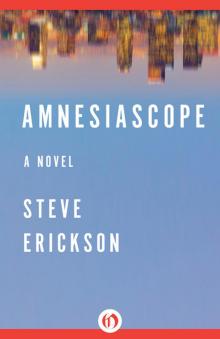 Amnesiascope
Amnesiascope Our Ecstatic Days
Our Ecstatic Days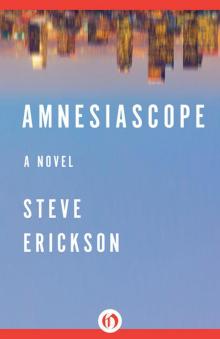 Amnesiascope: A Novel
Amnesiascope: A Novel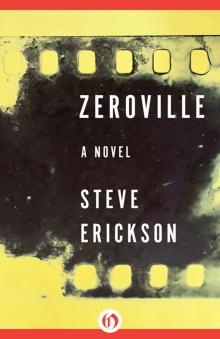 Zeroville
Zeroville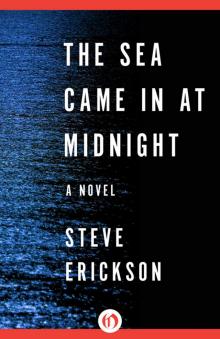 The Sea Came in at Midnight
The Sea Came in at Midnight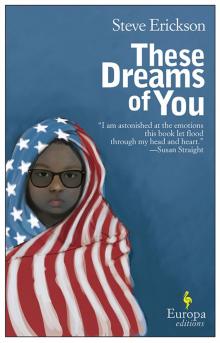 These Dreams of You
These Dreams of You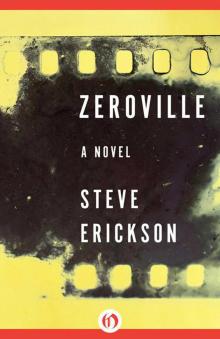 Zeroville: A Novel
Zeroville: A Novel Days Between Stations
Days Between Stations (1993) Arc d'X
(1993) Arc d'X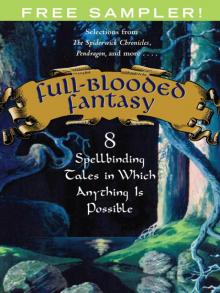 Full-Blooded Fantasy
Full-Blooded Fantasy